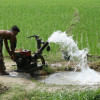Ongoing heatwave raises concerns over Boro yield

The heatwave that has been sweeping across the country for over two weeks has raised concerns regarding agricultural production, particularly vegetables, mango and Boro paddy that are in the flowering and grain formation stages.
Under the circumstances, growers can do little apart from ensuring irrigation so that the paddy gets adequate water and do not turn out dry or underdeveloped.
"The irrigation for the heatwave is going to increase my cost of production and I have no alternative but to do so to protect my Boro crop," said farmer Yasin Ali of Buipara village in the northwestern border district of Dinajpur.
April usually brings showers which meet a portion of the irrigation requirements, he said.
However, this year, the skies have remained unusually devoid of clouds, said Ali, apprehending that the harvests would be delayed.
Boro season paddy is the country's principal crop, accounting roughly 55 percent of total annual rice production.
Data from the Department of Agricultural Extension (DAE) showed that farmers have grown the dry season crop on 48.56 lakh hectares of land this time around, up marginally from 48.52 lakh hectares in the previous year.
Agricultural officials said roughly 20 percent of the crop have already been harvested.
"We are ensuring water for the rice field. Up until now there is no big damage," said farmer Toriqul Islam of the southwestern district of Jashore over the phone yesterday.
Amidst the heatwave, Bangladesh Agro-Meteorological Information Service (BAMIS) for the third time this month, recommended that cultivators ensure adequate moisture on the croplands.
Earlier this month, the BAMIS issued the advice for 54 districts and re-issued the advice to protect crops on the field, including Boro paddy, from the mild to moderate heatwave that arose on April 4.
Up until now there has been no sign of the weather easing.
Yesterday, Bangladesh Meteorological Department said the prevailing heatwave may continue until April 23.
Niaz Md Farhat Rahman, principal scientific officer and coordinator of Agromet Lab at Bangladesh Rice Research Institute (BRRI), said temperatures above 35 degrees Celsius affect flowering and grain formation of paddy.
This directly impacts the yield of rice, he said.
Chances of pollination reduces if the temperature exceeds 35 degrees Celsius even for a couple of hours. As a result, the number of dry or underdeveloped rice grains rises, he said.
To avoid this, farmers are being advised to keep 5 to 7 inches of water in the field now, he said.
High temperatures also leave paddy plants susceptible to neck blast disease and to prevent this, farmers should use pesticides, the scientist added.
"We, from BRRI, have already issued a bulletin in this regard and we suggest farmers ensure water on the land until April 30," he said.
However, the risk of yield losses is not limited to rice.
Islam of Jashore, where 40.2 degrees Celsius temperature was recorded yesterday, said the heatwave was affecting vegetables on the field and bitter gourd plants were drying up.
Emdadul Haque Milon, a farmer of the northwestern bordering district of Lalmonirhat, said high temperatures deter growth of plants. This is likely to affect overall yield, he added.
Badal Chandra Biswas, director general of the DAE, said their office was advising farmers to ensure water in the rice fields until the grains hardened.
Crops that have been planted late might be affected for the current heatwave. The ratio of such crop would be up to three percent, he said.
"Farmers usually maintain water in their rice fields during this period. So, we hope there will be no significant negative effect," he added
However, there is a risk of mangoes falling off trees prematurely, said Biswas.
(Our Dinajpur correspondent contributed to this report)

 For all latest news, follow The Daily Star's Google News channel.
For all latest news, follow The Daily Star's Google News channel. 





Comments